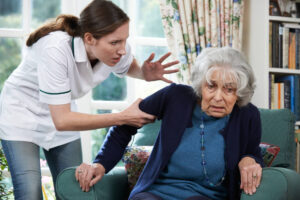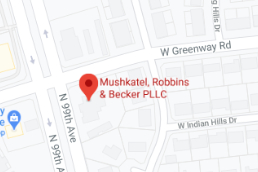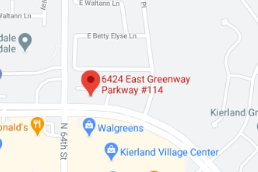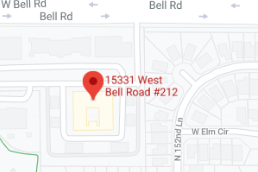
Elder abuse is a serious problem in Arizona. The state Adult Protective Services program reported nearly 24,000 new cases of alleged abuse in a single recent year. That number likely represents just a fraction of the total instances of abuse – and one that is likely to grow as the industry struggles with staffing shortages and a growing population of older people.
Nursing homes must care for their residents with respect and dignity. When they fail to do so, innocent people get hurt. Victims of nursing home abuse and neglect in Peoria, Arizona, deserve justice and financial compensation for their suffering.
Holding nursing homes accountable for abuse and neglect can be challenging without the help of an experienced and tenacious attorney like the ones you will find at Mushkatel, Robbins & Becker, PLLC. We have more than 50 years of experience protecting the rights of nursing home residents and their families. We are ready to help you demand justice from the nursing home that hurt your loved one.
Contact our law firm today for a free initial consultation with a nursing home abuse and neglect lawyer in Peoria, AZ.
Table of Contents
- Who Could Be Held Responsible for Nursing Home Abuse?
- What Are Common Injuries Experienced Due to Nursing Home Neglect
- What Compensation is Available in Nursing Home Abuse Claims?
- What Are Signs of Nursing Home Abuse or Neglect?
- What is the Difference Between Abuse and Neglect?
- How a Nursing Home Lawyer Can Help in a Nursing Home Abuse Case
Who Could Be Held Responsible for Nursing Home Abuse?
Because nursing homes often have complex ownership structures and employ people in many roles, multiple parties could be liable for abuse and neglect. Some of these potentially responsible parties include:
- Medical staff – Doctors, nurses, physical therapists, and other healthcare staff could be liable for providing poor care or failing to ensure that residents’ medical needs are met.
- Administrative staff – Nursing home administrators should be watchful for signs of abuse and neglect. They can be held liable for their own negligence or the negligent actions of staff under their supervision.
- The facility’s license holders – The state Department of Health Services licenses all nursing homes in Arizona except those located on tribal lands. Nursing homes have to follow specific guidelines to keep their license. Failing to do so could mean the license holders are liable for abuse and neglect cases.
- Corporate owners – The individual or business that holds the license for a nursing home in Arizona may not be the entity that owns the facility. If there is a pattern of abuse or neglect at a nursing home, it may be due to lax oversight from the owners or a lack of resources to make sure residents are properly cared for.
- Outside healthcare providers – If a nursing home brings in outside help for certain services, these providers could be liable for providing poor care, failing to report apparent signs of abuse and neglect, or committing abuse themselves.
- Other residents – Physical assaults, sexual abuse, emotional abuse, verbal harassment, and other injuries from fellow residents can happen in nursing homes, especially if staff are not adequately monitoring the well being of residents under their care.
What Are Common Injuries Experienced Due to Nursing Home Neglect
Some of the most common signs of nursing home neglect and abuse are:
- Falls
- Dehydration and malnutrition
- Weight loss
- Medication errors
- Infections
- Bedsores
- Injuries from improper restraints

What Compensation is Available in Nursing Home Abuse Claims?
Nursing home abuse can cause residents to suffer physical injuries, economic losses, and psychological trauma. While there is no way to undo these horrific injuries, a personal injury lawsuit may allow victims of abuse or neglect to recover compensation for:
- Medical bills related to the treatment they need for their injuries, including the cost of future care
- Emotional distress resulting from the abuse or neglect
- Pain and suffering from physical injuries related to abuse or neglect
- Diminished quality of life due to abuse or neglect
- Funeral and burial expenses in cases where abuse or neglect leads to wrongful death
- Money taken from them through fraud, identity theft, or other illegal means
- Punitive damages in certain cases to punish defendants for particularly egregious wrongdoing
What Are Signs of Nursing Home Abuse or Neglect?
Some signs of abuse and neglect to watch out for include:
- Mood changes – Victims of abuse or neglect may become sullen and withdrawn or become more easily irritated. It is especially common in cases where the victim cannot verbalize what is happening to them.
- Weight loss – A weight change may indicate someone is receiving adequate nutrition, that they may be traumatized, or that they may be refusing food in protest over the abuse they have been subjected to.
- Dehydration – Dehydration is a common sign of neglect if a nursing home resident is not getting adequate care.
- Bedsores – Bedsores are signs that a nursing home resident has been confined to their bed too often or that the staff is not taking adequate care of them.
- Infections – Infections are often the result of poor medical care or neglect.
- Broken bones – A resident may suffer broken bones if they are physically attacked or fall because of inadequate supervision.
What is the Difference Between Abuse and Neglect?
The main difference between abuse and neglect is whether the harm someone suffers is active or passive.
If a nursing home resident is injured because of something done directly to them – for example, if an orderly or nurse strikes them – that is generally considered abuse.
On the other hand, neglect is generally the result of nursing home residents being ignored or overlooked. For instance, if there are not enough staff at a nursing home, a resident may not get enough food or be left in isolation for long periods.
How a Nursing Home Lawyer Can Help in a Nursing Home Abuse Case
Nursing home abuse can be challenging to prove and may require the help of an attorney who is experienced in handling such cases. A lawyer may be able to help you and your loved one by:
- Gathering evidence from a resident’s medical documentation, expert witnesses, facility records, eyewitness accounts, and other sources
- Identifying the injuries and other losses the resident has suffered
- Filing all necessary legal paperwork correctly and in a timely fashion
- Negotiating with the liable parties for a reasonable settlement
- Taking your case to court if necessary
If you want to know more about how our Peoria, AZ, nursing home abuse and neglect attorneys can help with your case, contact us today for a free initial consultation.











